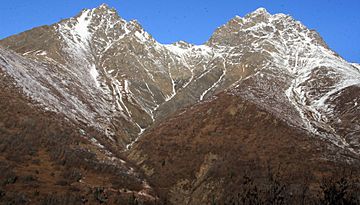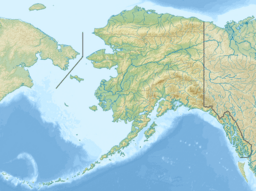Twin Peaks (Alaska) facts for kids
Quick facts for kids Twin Peaks |
|
|---|---|

Twin Peaks seen from near Eklutna Lake
|
|
| Highest point | |
| Elevation | 5,840+ ft (1,780+ m) |
| Prominence | 1,378 ft (420 m) |
| Parent peak | Bashful Peak (8,005 ft) |
| Geography | |
| Location | Chugach State Park Matanuska-Susitna Borough Alaska, United States |
| Parent range | Chugach Mountains |
| Topo map | USGS Anchorage B-6 |
| Climbing | |
| Easiest route | Scrambling class 3-4 |
Twin Peaks is a tall mountain in Alaska, United States. It stands about 5,840 feet (1,780 meters) high. This mountain is special because it has two main tops, or "summits," close together.
You can find Twin Peaks in the Chugach Mountains. It is part of the beautiful Chugach State Park. The mountain is located in the Matanuska-Susitna Borough.
About Twin Peaks
Twin Peaks is northeast of downtown Anchorage. It is also south of Palmer. The mountain is just north of Eklutna Lake.
The eastern peak is the taller of the two summits. The western peak is a bit lower, at about 5,472 feet (1,668 meters). There is also a rock formation called Goat Rock nearby.
Mountain's Name
The name "Twin Peaks" was officially recorded in 1960. This was done by the United States Geological Survey. The name describes the two main tops of the mountain.
However, the mountain had an older name. In the Denaʼina language, it was known as Lach Q'a. This name was used by the native people of the area.
Climbing Twin Peaks
Climbing Twin Peaks can be a challenge. It involves a type of climbing called scrambling. This means using both your hands and feet to get up steep parts.
Climbers need to be careful because there can be loose rocks. These rocks can make the climb dangerous. A trail called the Twin Peaks Trail exists. It starts near the boat launch at Eklutna Lake Road. However, this trail does not go all the way to the top of the mountain.
Weather at Twin Peaks
Twin Peaks is in a subarctic climate zone. This means the area has very long, cold, and snowy winters. Summers are usually mild, not too hot.
Winter temperatures can drop very low. They can go below -20 °C (-4 °F). With the wind, it can feel even colder, sometimes below -30 °C (-22 °F). Rain and melted snow from the mountain flow into streams. These streams then join the Knik River.
 | Delilah Pierce |
 | Gordon Parks |
 | Augusta Savage |
 | Charles Ethan Porter |


